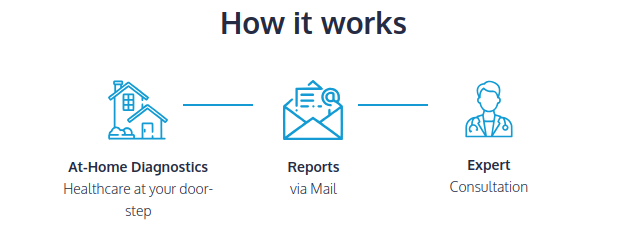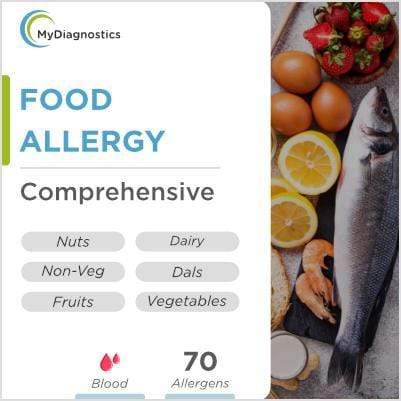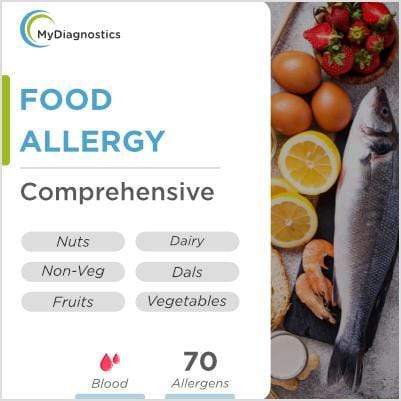Comprehensive 70 Allergen Food Allergy Test (IgE): At-Home Blood Test & Price
Test Parameters

This comprehensive IgE food allergy blood test helps identify immediate allergic reactions to 70 commonly consumed foods, highlighting the wide range of allergens tested, including various food categories. Using a clinically validated IgE panel, we detect immune responses linked to symptoms like itching, hives, swelling, or digestive distress, as well as other allergic symptoms. This panel offers one of the broadest food allergen coverages available, helping identify clinically relevant allergic sensitivities.
What Is a Food Allergy Blood Test (IgE)?
A Food Allergy Blood Test (IgE) and Food Allergy panel is a medical test which examines certain substances causing allergic reactions in your body. This test detects Immunoglobulin E (IgE) antibodies, which your immune system produces in response to allergens. The test is performed using a blood sample drawn from a vein, allowing laboratory analysis to detect IgE antibodies in the blood.
While IgE antibodies are also involved in environmental allergies such as dust mites or animal dander, this panel specifically focuses on food-based allergens only. The immune system's production of IgE antibodies is part of the body's response to allergens, and the test measures this response to help diagnose food allergies.
This test identifies specific food allergens by measuring IgE antibodies in the blood, without exposing the patient directly to allergens. It is one of several diagnostic tests used to identify food allergies and is particularly effective for identifying specific allergens responsible for allergic reactions.
The Science Behind IgE
The 70 Allergen IgE Food Allergy Blood Test identifies an individual's allergic reactions to commonly consumed foods. It detects immune responses linked to symptoms such as itching, hives, swelling, breathing difficulty, or digestive distress.
The test provides a complete allergy profile with at-home sample collection, NABL-certified lab processing, and expert-reviewed reports.
Allergy vs. Intolerance: Know the Difference
Food intolerances, such as lactose intolerance and gluten sensitivity, are considered digestive or metabolic issues. These typically cause delayed symptoms like bloating or fatigue.
In contrast, food sensitivities usually involve less severe, non-immune reactions that mainly affect digestion. Mild discomfort and itchy skin are among the initial symptoms of food allergies. The table below will help you distinguish the differences properly.
Food Allergy vs Food Intolerance / Sensitivity – Key Differences
|
Feature |
Food Allergy (IgE-Mediated) |
Food Intolerance / Sensitivity (Non-IgE Mediated) |
|---|---|---|
|
Underlying Mechanism |
Immune system reaction involving IgE antibodies; immune system reacts to specific food proteins |
Digestive, metabolic, or non-IgE immune responses |
|
Reaction Time |
Immediate (minutes to 2 hours) |
Delayed (2–72 hours) |
|
Severity |
Can be severe or life-threatening (anaphylaxis) |
Chronic, low-grade, rarely life-threatening |
|
Common Symptoms |
Hives, swelling, wheezing, throat tightness, anaphylaxis, itchy skin, mild discomfort |
Bloating, gas, IBS-like symptoms, headaches, fatigue, acne |
|
Immune Involvement |
Yes – IgE antibodies |
No IgE involvement |
|
Primary Diagnostic Methods |
IgE blood test, skin prick tests, supervised oral food challenge |
Elimination diet, breath tests (e.g., lactose intolerance), clinical assessment |
|
Role of IgG Testing |
Not applicable |
May be used for dietary guidance, not diagnostic confirmation |
|
Clinical Acceptance |
Widely accepted and guideline-supported |
Diagnosis based on symptom correlation rather than biomarkers |
|
Use Case |
Emergency risk assessment and allergy confirmation |
Long-term symptom management and dietary planning |

Individualized counselling implies that the allergic reactions are managed effectively. It reduces unnecessary medication and processes and drags you to improved future health. Being aware of your own allergy profile will not only allow you to make better choices but reduce the frequency and severity of reaction of your body, living a more comfortable and healthier life.
What Does This Comprehensive IgE Allergy Panel Include?
Our 70 allergen IgE blood test panel is designed to test many of the most commonly implicated food allergens, covering a wide variety of different foods such as dairy, nuts, seafood, grains, and more. The panel is specifically designed to identify potential allergens in your diet, helping you pinpoint which foods may be causing allergic reactions. In total, the panel includes 70 allergens tested, providing a comprehensive overview of the most relevant food allergens to ensure thorough and detailed results.
This panel test covers common allergens from certain foods.
Non-Vegetarian Foods: Includes various food proteins that can trigger allergic reactions.
Please note, this panel focuses on food allergens and does not include environmental allergens such as household dust.
Allergen Categories Covered
-
Dairy & Milk Products (5 Allergens): Milk, butter, cheese, curd, and paneer
-
Nuts & Seeds (5 Allergens): Cashew, peanut, walnut, almond, and sesame
-
Vegetables (20 Allergens): A wide range of commonly consumed vegetables that usually trigger IgE-mediated reactions
-
Fruits (10 Allergens): Popular fruits related to oral allergy syndrome and systemic reactions
-
Spices (7 Allergens): Common Indian spices
-
Starch Foods (7 Allergens): Rice, corn, wheat, and other staple starch sources
-
Non-Vegetarian Foods (14 Allergens): Various fish, egg, chicken, mutton, prawn, and other food proteins
-
Dal / Pulses & Others: 5 types of dal and pulse allergens
Who Should Take This Comprehensive Allergy Panel Test
The food allergy panel test is recommended for people who experience an immediate food-related allergic response. It helps to identify specific allergens behind an allergic reaction. This test is suitable for all age groups, from infants to adults. The test is especially useful for evaluating a child's symptoms when food allergies are suspected. It also helps clarify the causes of an individual's allergic reactions by pinpointing the specific triggers. Identifying food allergy symptoms—including both digestive and respiratory symptoms—is important to prevent serious health issues.
While most symptoms are mild, some can be severe, and allergy skin tests and other diagnostic tests may be recommended for further evaluation.
Allergy Symptoms Covered By the Allergy Comprehensive Panel Test
This test should be taken into consideration if you encounter:
-
Hay fever (urticaria), severe skin rashes, or itching
-
Wheeze, runny nose, nasal congestion, or trouble breathing after eating
-
Reproducible symptoms occurring shortly after consuming specific foods
-
Symptoms of allergies without a known cause
-
Nausea, vomiting, abdominal pain, or diarrhea shortly after eating
Food Allergy Panel Test Cost & Price in India
The Food Allergy Blood Test (IgE) –70 Allergen Panel costs ₹2,900 (originally ₹4,900).
This price includes:
-
Price includes free home sample collection by a qualified phlebotomist.
-
ISO and NABL-certified laboratory testing
-
Digital reports are sent via email in three to five days.
Is this an At-home sample collection food allergy blood test?
Indeed, this is a convenient at-home food allergy test. You will receive a thorough test report to assist you in comprehending your results after your sample has been evaluated.
How it Works
-
A qualified phlebotomist comes to your house.
-
A sample of venous blood is taken.
-
In a licensed laboratory, the sample is examined.
When compared to rapid or self-test kits, this approach guarantees greater clinical accuracy. For additional diagnosis and confirmation of particular food allergies, your healthcare professional may occasionally suggest an oral food challenge or an elimination diet.
Simple 4-Step Process
For an at-home food allergy check, simply follow these four steps:
-
Make an online test reservation
-
A phlebotomist comes to your house
-
IgE antibody analysis in the lab
-
Digitally supplied report
Services Offered: Food Allergy Test Near You
In all of India’s main cities, MyDiagnostics offers home sample collection for food allergy testing. To guarantee your safety and a seamless, stress-free experience, our certified personnel adhere to stringent safety and hygiene procedures, and strict supervision is maintained throughout the sample collection process. Please note that this food allergen test does not cover environmental factors such as pet dander, pollen, or dust mites; separate testing is required to identify sensitivities to these common airborne allergens.
Available in Major Cities Across India
MyDiagnostics provides the allergy test service in several cities, including
- Delhi
- Mumbai
- Bengaluru
- Chennai
- Hyderabad
- Pune
- Kolkata
- Ahmedabad
- Jaipur
- Chandigarh
- Noida
- Gurugram
- Ghaziabad
-
Faridabad
- Lucknow
Why Choose MyDiagnostics?
Trusted by Thousands Across India
MyDiagnostics provides a dependable and stress-free testing experience by combining clinical accuracy, transparency, and patient-first care.
NABL & ISO Certified Labs – Gold-Standard Accuracy
MyDiagnostics ensures strict adherence to national and international quality standards. We process all tests in laboratories recognized by ISO and NABL. This implies:
-
Accurate and repeatable outcomes
-
Highly reliable testing techniques
-
Reputable, quality-controlled reporting
Our reports satisfy the medical professionals, hospitals, and specialists' standards throughout India.
Transparent Pricing – No Hidden Costs
You pay for what you see when using MyDiagnostics.
-
No unexpected extra costs
-
No additional fees for collecting samples at home
-
No additional reporting or consultation charge
Pan-India Service – Accessible in 15+ Major Cities
MyDiagnostics makes advanced allergy testing available everywhere by providing doorstep sample collection in more than 15 major Indian cities. Our skilled phlebotomists adhere to the utmost safety and hygienic guidelines. We guarantee a seamless, cozy experience in the comfort of your own home.
Expert Consultation Included – Actionable Insights, Not Just Reports
Expert consultation support is included with your test results. It helps to assist in:
-
Correctly interpret IgE levels
-
Recognize which foods actually cause allergies
-
Clear dietary restrictions
Make safe dietary and lifestyle adjustments. Be aware of the possibility of serious reactions like anaphylactic shock. Most importantly, make sure you have medical professional advice.
Risks and Limitations of Allergy Testing
Allergy testing is a valuable diagnostic procedure that helps identify substances responsible for triggering allergic reactions in your body. While these tests—such as allergy blood tests and skin tests—are generally safe and widely used, it’s important to understand their potential risks and limitations before proceeding.
Interpreting Comprehensive Allergy Test Results
Our expert healthcare professional will examine the results of your comprehensive IgE food allergy blood test and provide you with a detailed report. It discusses the precise chemicals that trigger allergic reactions in your body.

Your allergy test findings are significant for a customized treatment plan and making wise choices regarding your diet and lifestyle. The presence of food-specific IgE indicates sensitization, which must be correlated with clinical symptoms for diagnosis. To properly manage your allergies and prevent triggers, your healthcare provider will assist you in interpreting the results in light of your medical history and most recent symptoms.
This test panel is designed in alignment with clinical allergy diagnostic practices and reviewed by qualified healthcare professionals






